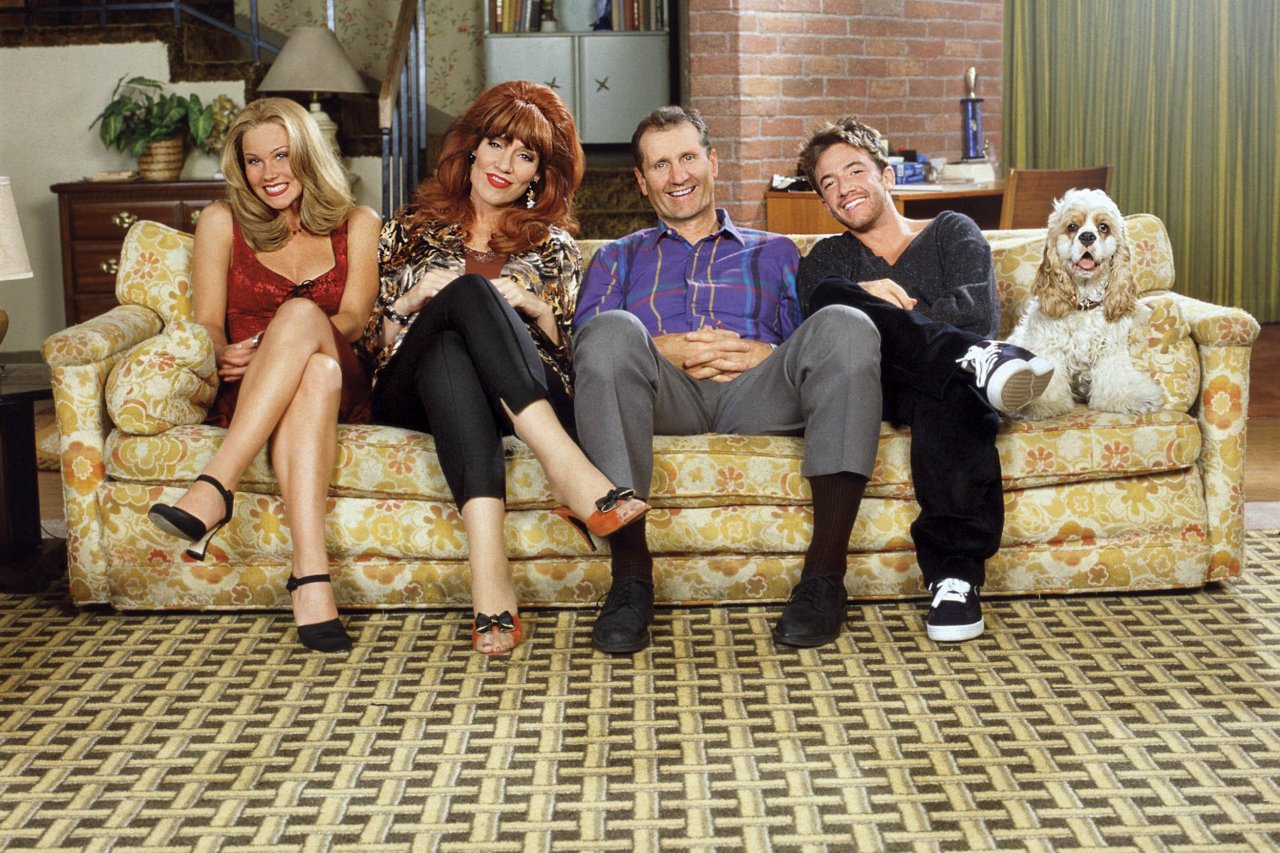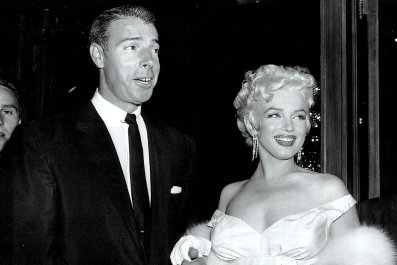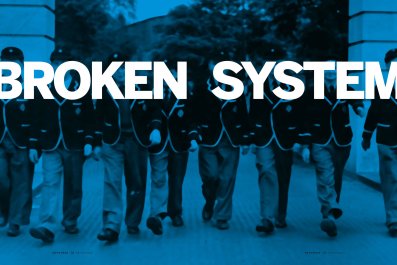The addiction returned two years ago, without warning, in the days after my daughter was born into the noisome cauldron that is midsummer New York City. She came into this world mewling, and, as is a newborn's wont, mewling remained, so there were many strange, impossible hours at which I found myself awake: 2:37 a.m., 4:12 a.m., ad insaniam. A father is painfully useless to a newly birthed human being, I discovered, so as my wife breast-fed and pacified, I wandered the apartment like a somnolent Lear, too guilty to return to bed, too sleep-deprived for any useful activity. Thus confounded, I would turn on the television. And there they were, in a zombie slot on TBS, my first family, my first love: the Bundys of 9764 Jeopardy Lane, Chicago, Illinois.
Very few of the Americans I know who came of age in the late 1980s and early '90s were allowed to commune with the Bundys. To admit that you were permitted to watch M...WC was like saying your parents were fine with your crack habit. But having recently emigrated from the Soviet Union, my mother and father had more pressing concerns than their oldest son's viewing habits. The quotidian struggles of the Bundy family had my full attention every afternoon.
M…WC saw me through middle school and two years of high school, after which point I absconded for the more sophisticated company of Seinfeld and Friends. In the subsequent decade and a half, there must have been entire years when I didn't think of "Touchdown Bundy," as paterfamilias Al was known when scoring touchdown after touchdown for the Polk High Panthers.
Then came my child, and back came Al. I had expected the newborn; the shoe salesman's return was a jarring surprise. But that made it no less welcome.
M…WC was Fox's first prime-time sitcom, though not its most auspicious one. Two weeks after the Bundys first entered Americans' living rooms, Fox premiered another sitcom, this one animated: The Simpsons. Both shows are helmed by a hapless suburban patriarch who would like nothing more than to drink generic American beer in front of the TV. Both shows pushed into new territory for the sitcom genre, one fueled by wickedly subtle intelligence, the other by unrelenting crudity. The smart one has endured; the boorish one has been forgotten.
But I have not forgotten you, Al Bundy, with your admonitions about the fat woman who walked into your shoe store. Nor you, Peggy, with the bonbons that never seem to soften your hourglass figure. Nor virginal Bud, nor meretricious Kelly (who came of age when calling a woman a "slut" on television was no biggie). You are relentless reminders that life is nasty, brutish and short. Watching you flail unfailingly fills me with joy of the sort William Wordsworth must have felt during his sojourns in the Lake District. It may well be that M…WC alleviates life's miseries by depicting them with undiluted determination, in what must have felt to the show's creators like an act of bold truth-telling in an America still aglow from Reagan's recent dawn. They called B.S. while reveling in the same and urging you, viewer, to dive right into the muck.
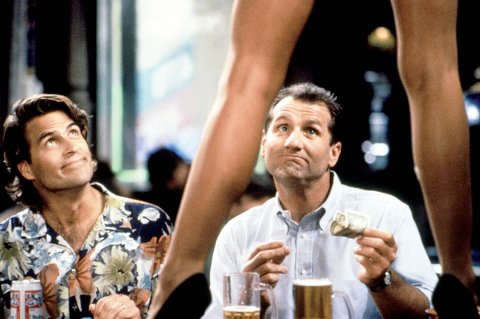
About three years after M...WC's premiere, one of its creators reflected on his unholy child: "The show was sold on the premise that no one is ever going to learn anything watching it," Michael G. Moye told Rolling Stone in 1989. "We're not going to raise anybody's consciousness." They certainly don't make them like M…WC anymore, nor seem to want to. More or less since the premiere of The Sopranos in 1999, too much of what's on TV has become something of a highbrow affair (or at least a high-middlebrow one). Al rhapsodizing about "hooters" seems like the relic of a less sophisticated age, a media prehistory that might make your average viewer of Homeland ashamed.
I don't buy it. I don't buy that Breaking Bad is art in the same way "Kubla Khan" is art. I enjoy Mad Men, but it isn't John Cheever. The passivity of television viewing means that it can never compete with the intellectual engagement of standing before a painting or reading a book: You can binge-watch House of Cards precisely because it requires so little of you. By contrast, a couple of hours at the Louvre prove intellectually exhausting to most mortals. Despite wishful assertions that television has entered the pantheon of high culture, the very best television is little more than middlebrow, defined by the scathing mid-century critic Dwight Macdonald as entertainment lightly but cleverly gussied up. Orange may be the new black, but it will never be the new Shakespeare.
What I revere about M…WC is that it didn't even try and, by not trying, succeeded on its own strange, sly terms, while avoiding the Lonely Crowd philosophizing of Don Draper and the pop-psych musings of Tony Soprano. Moye and Ron Leavitt created M…WC to challenge the conventions of the American sitcom. All in the Family had already done that, but the Bundys made the Bunkers look like extras from Masterpiece Theater. At least the outrage of Archie Bunker was rooted in a white ethnic bewilderment at the state of things in late Nixonland; Al Bundy, on the other hand, evinces a rage at the world that is both more vague and more profound, an anger less political than existential. Though not a conservative, Al is deeply nostalgic, an erstwhile high school football star who now works at Gary's Shoes & Accessories for Today's Woman, making $3.25 per hour. Who, in his place, would not yearn for another chance at life? At the heart of his existence are questions that all of us who are older than 25 have asked ourselves, either in the middle of a sleepless night or on a too-ordinary Tuesday afternoon: How did I get here? Is this real life, or does the real one begin after this one, full of dulling detours, ends?
M…WC reached its apex around the same time the sociologist James Davison Hunter published Culture Wars: The Struggle to Define America. I am not entirely sure where, exactly, M…WC fits in with the Moral Majority crowd. Al is hardly the paragon of Sunday morning virtue, but his broadsides against homosexuals ("sissies"), intellectuals ("They wouldn't know a breast from a football because they never touched either") and feminism (Al forms a group called the National Organization of Men Against Amazonian Masterhood, or NO MA'AM) dovetails nicely with that crowd's gripes. Al is the prototype for Joe the Plumber: deeply principled, blissfully ignorant.
Al's anger is largely directed at women who don't look like Playboy models, and the show's misogyny is so casual and pervasive, you fail to notice it after a while. At the same time, for all the enlightened politics of today's television, I don't know of another show that so perfectly (if inadvertently) captures the manifold ugly facets of male impotence and rage.
It took me years to recognize an obvious, unspoken truth: If Al is so miserable with Peg, then he should divorce her. Nor do his children bring him any pleasure; they want only his money. And yet divorce is never discussed (though spousal murder sometimes is). Al would rather, like Hamlet, bear those ills he has than fly to others that he knows not of. And so he stays. And stays. And stays.
Aren't we all staying in something we know we should leave? Don't even the best and brightest among us sometimes end up selling shoes? Isn't it bothersome that the ones we love most have the most power to disappoint? Isn't it strange how sometimes what starts as casual affinity ends up being touted as holy, everlasting matrimony? Isn't it weird how we want to live through our children while our children want only to be through with us?
I am just asking…
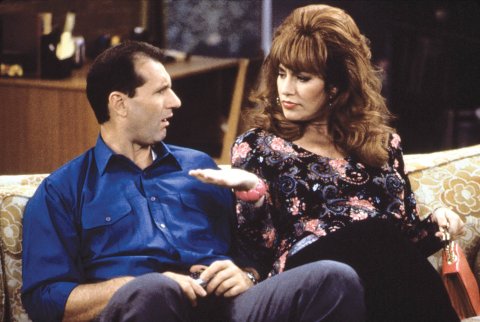
The Shelling Never Stops
M…WC is the sitcom most resistant to binge watching, whereas some shows with strong narrative backbone (The Wire comes to mind) demand several hours of your attention at a sitting. Even as a habitué, I can't stomach more than three or four episodes in a row, so unremitting is the Bundys' misery. The show is like a war movie in which the shelling never stops: Al complains about Peg's laziness, while Peg mocks Al's sexual stamina. Bud makes fun of Kelly's promiscuity, while Kelly mocks Bud's virginity. M…WC is a testament to the Latin phrase homo homini lupus ("Man is wolf to man").There is something refreshing about a show so stubbornly determined to make quotidian misery its focal point.
Some pretty serious people have suggested that M…WC was supposed to mock the angry white male, especially since one of its creators was black and a surprising number of its writers, over the years, were women. Then again, a joke that went on for that long was perhaps not a joke at all. Maybe this wasn't a comedy but a cri de coeur.
Samuel Beckett said: "You must go on, I can't go on, I'll go on."
Al Bundy said: "Life didn't pass me by; it sat on my head."
Kurt Vonnegut said: "So it goes."
People Are Nice to Bunnies
After that first summer of postnatal hell, I went back to work, and my nightly communion with the Bundys ceased. There returned days when I thought about Al Bundy not once. And then, one night, my wife, daughter and I were caught on a miserably late flight back to New York. My daughter slept, thank God, but did so in a way that prevented both me and my wife from enjoying a minute of shut-eye. As pastel dawn seeped into the sky, we scrolled helplessly through the channels, whose sales pitches and breaking-news chyrons and synthetic laugh tracks started to bleed into one lurid procession, a lumpen mass of human desire and despair.
And then, suddenly, there they were. Al was having another bad day at work, Bud had failed to get laid while Kelly was getting laid too much, and Peg was sitting on the couch, ordering geegaws and popping chocolates into her mouth. Some ear-popping minutes later, the pilot came over the public announcement system to say we were on our initial descent to JFK; my daughter rustled in my lap. But all I wanted was to keep watching, like a recovering alcoholic who has been handed a glass of Scotch and knows, from the first leathery sip, that nothing will drag him into a church basement ever again.
But now that I've settled into fatherhood, more or less, I can't enjoy M…WC with the same pleasure. In fact, I've come to understand why that pleasure was always qualified by an inchoate hesitation. In many ways, M…WC reminds me of the children's books I have been reading to my daughter. She is 2 years old now, and, consequently, most of the books she consumes are utterly free of conflict. People are nice to bunnies, while bunnies are nice to people. Flowers grow abundantly. Nothing ever dies, nobody ever goes away, and nobody ever deceives. Kindness and sharing are preached without any acknowledgement of how tragically rare these qualities are in the lupine world. All things are all right.
Look, I get it. A child's psychology is fragile, and since the pain of adulthood is pretty much inevitable, there is no need to hasten its arrival. But that doesn't change the fact that the books I read to my daughters are lies. I want to whisper to her, when we're done, You know, it's not really like that. I mean, have you ever seen a fox befriend a bunny?
Which brings me back to M…WC, which is all foxes and no bunnies. Odd as it may sound, the show lacks the very same thing missing from too many of my daughter's books: nuance. The show presents a streamlined vision of the world in which nothing is complicated and where no shadowy mystery remains. The weltanschauung of M…WC is exactly as complicated and nuanced as that of Happy Birthday, Bunny! Everything has been resolved for you; all you have to do is sit back and enjoy the ride.
By nuance, I don't mean detail. Mad Men is plenty detailed, and while it serves as a fine museum piece of mid-century corporate culture, it is hardly more nuanced in its worldview than M…WC. It's just a little smarter and a whole lot slicker (though I am really not sure Don Draper is much more principled than Al Bundy; in fact, for all his bluster, Al is a superior husband to philandering Don). By nuance, I mean what Tolstoy does in Anna Karenina or what Virginia Woolf does in Mrs. Dalloway, leaving you in a maelstrom of existential confusion from which you neither can nor want to escape. Out of that maelstrom emerges the thing we might call art.
The one children's book I enjoy reading as much as my daughter does is Oh, the Places You'll Go! by Dr. Seuss, who is far more comfortable than most children's authors with life's icky mysteries. The book has plenty of upbeat encouragement, but its happy parts are cleverly shaded by darker hues, acknowledgements that life can be frustrating and confusing, not to mention exceedingly lonely. The book is a popular graduation gift, which I suspect it would not be if it were merely optimistic pabulum. The world is a complex place. It makes no sense to pretend otherwise. We are sometimes bunnies, but too often Bundys. So it goes.



